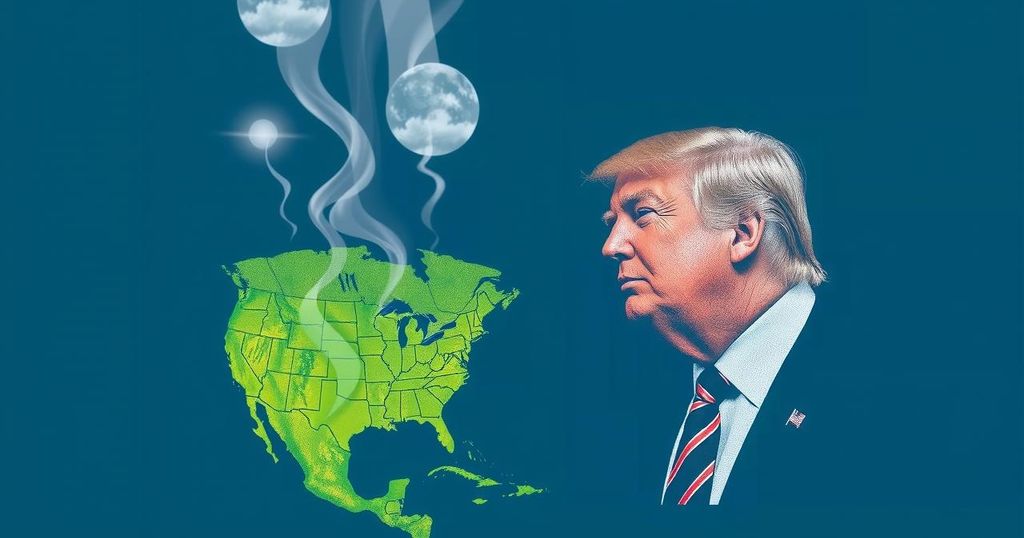World news
ALASKA, ARCTIC NATIONAL WILDLIFE REFUGE, ASIA, BRAZIL, CHINA, CHRISTIAN, CHRISTIANA FIGUERES, CLIMATE CHANGE, DONALD TRUMP, ENVIRONMENTAL POLICY, EU, GLOBAL WARMING, GREENHOUSE GAS EMISSIONS, INDIA, MEXICO, NORTH AMERICA, POLITICS, SOUTH AMERICA, TRUMP, UNFCCC, UNITED STATES, UNITED STATES OF AMERICA, US, WHITE HOUSE
Jamal Abdullah
0 Comments
Implications of Trump’s Re-Election on Global Climate Change Efforts
Donald Trump’s second presidency raises concerns for climate change initiatives, as potential US withdrawal from the Paris Agreement could worsen global efforts to combat rising temperatures. However, climate advocates assert that action will persist, with opportunities for other nations to lead in renewable energy and sustain their commitments despite potential setbacks in US policy.
As Donald Trump embarks on his second term as President of the United States, global climate change advocates express significant concern. His potential withdrawal from the Paris Agreement and termination of regulations aimed at reducing emissions could exacerbate the already pressing issue of rising global temperatures. With the US being the second highest emitter, Trump’s actions may hinder progress made towards keeping temperature increases below 1.5 degrees Celsius by the century’s end. Previous actions during his first presidency, such as leaving the Paris Agreement and reversing numerous environmental protections, reveal a troubling trend that could resurface. However, climate action is expected to persist despite Trump’s stance. Christiana Figueres, former Executive Director of the UNFCCC, emphasized that while this election outcome hampers global climate efforts, it will not stifle the momentum towards decarbonization. Clean energy technologies are positioned to outperform fossil fuels based on their efficiency and sustainability. This shift also positions countries like China, which leads in renewable energy and cleantech production, to assume a greater role in global climate leadership if the US retreats. If Trump reverses initiatives like the Inflation Reduction Act, the resulting economic shifts may benefit nations such as the EU, India, and Brazil, which are committed to advancing their climate agendas. Dr. Arunabha Ghosh, CEO of CEEW, noted that implications of US climate policies could disrupt supply chains and climate finance flows, with varied effects on countries like India. Additionally, many nations remain resolute in their climate commitments irrespective of US policy changes, indicating that proactive climate leadership can emerge from multiple fronts globally. In summary, while Trump’s agenda may pose challenges to international climate efforts, it also presents opportunities for other countries to advance their initiatives and technologies.
This article explores the potential repercussions of Donald Trump’s re-election on global climate change initiatives. It addresses the implications of the US’s potential withdrawal from key international agreements, particularly the Paris Agreement, and discusses how this could shift the dynamics of climate leadership towards countries like China, which are advancing in renewable energy and technology production. The article emphasizes the reactions and adaptations of various nations and the ongoing momentum for climate action despite setbacks in US policy.
In conclusion, Trump’s return to the presidency poses significant risks to global climate action, particularly if the United States retreats from the Paris Agreement and diminishes its commitment to reducing emissions. Nevertheless, the resilience of the climate movement suggests that other global leaders may step in to fill the vacuum, fostering continued progress toward a sustainable future. Nations worldwide appear committed to their climate agendas, indicating a collective effort to combat climate change despite changes in US leadership.
Original Source: carboncopy.info




Post Comment